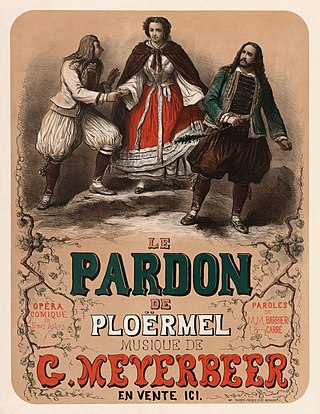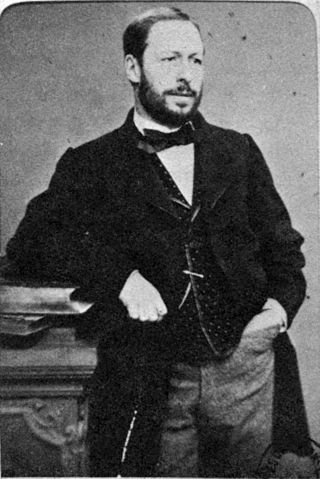Related Research Articles

Giacomo Meyerbeer was a German opera composer, "the most frequently performed opera composer during the nineteenth century, linking Mozart and Wagner". With his 1831 opera Robert le diable and its successors, he gave the genre of grand opera 'decisive character'. Meyerbeer's grand opera style was achieved by his merging of German orchestra style with Italian vocal tradition. These were employed in the context of sensational and melodramatic libretti created by Eugène Scribe and were enhanced by the up-to-date theatre technology of the Paris Opéra. They set a standard that helped to maintain Paris as the opera capital of the nineteenth century.

Les Huguenots is an opera by Giacomo Meyerbeer and is one of the most popular and spectacular examples of grand opera. In five acts, to a libretto by Eugène Scribe and Émile Deschamps, it premiered in Paris on 29 February 1836.

Robert le diable is an opera in five acts composed by Giacomo Meyerbeer between 1827 and 1831, to a libretto written in French by Eugène Scribe and Germain Delavigne. Robert le diable is regarded as one of the first grand operas at the Paris Opéra. It has only a superficial connection to the medieval legend of Robert the Devil.

L'Africaine is an 1865 French grand opéra in five acts with music by Giacomo Meyerbeer and a libretto by Eugène Scribe. Meyerbeer and Scribe began working on the opera in 1837, using the title L'Africaine, but around 1852 changed the plot to portray fictitious events in the life of the Portuguese explorer Vasco da Gama and introduced the working title Vasco de Gama, the French version of his name. The copying of the full score was completed the day before Meyerbeer died in 1864.

Il crociato in Egitto is an opera in two acts by Giacomo Meyerbeer, with a libretto by Gaetano Rossi. It was first performed at La Fenice theatre, Venice on 7 March 1824. The part of Armando was sung by the famous castrato, Giovanni Battista Velluti; the opera was probably the last to feature a leading role written for a castrato. It is the last of Meyerbeer's series of operas in Italian, and became the foundation of the composer's international success.

Margherita d'Anjou is an opera semiseria in two acts by Giacomo Meyerbeer. The Italian libretto was by Felice Romani after a text based on legends around the English Wars of the Roses by René-Charles Guilbert de Pixérécourt. The title role is the Queen Margaret of Shakespeare's Henry VI plays, who also appears in Richard III. Margherita d'Anjou is the first opera by Meyerbeer to mix historical events and personages with fictional characters and situations, as his French grand operas Les Huguenots, Le prophète and L'Africaine were later to do. It is the fourth of Meyerbeer's Italian operas and was his first international success.

L'esule di Granata is a melodramma serio in two acts by Giacomo Meyerbeer. The Italian libretto was by Felice Romani based on the rivalries between the Zegridi and the Abenceraggi factions in the last days of the kingdom of Granada. It is the fifth of Meyerbeer's Italian operas but had only three confirmed stagings in the 19th century. The world premiere took place at La Scala, Milan, on 12 March, 1822.
Frizak the Barber is a comic ballet in one act, with choreography by Marius Petipa and music adapted by Ludwig Minkus from themes derived from Italian opera.
L'artisan is an opéra comique by Fromental Halévy, to a libretto by Jules-Henri Vernoy de Saint-Georges.

Dinorah, originally Le pardon de Ploërmel, is an 1859 French opéra comique in three acts with music by Giacomo Meyerbeer and a libretto by Jules Barbier and Michel Carré. The story takes place near the rural town of Ploërmel and is based on two Breton tales by Émile Souvestre, "La Chasse aux trésors" and "Le Kacouss de l'Armor", both published separately in 1850 in the Revue des deux mondes.

Lodovico Graziani was an Italian operatic tenor. According to John Warrack and Ewan West, writing in The Oxford Dictionary of Opera: "His voice was clear and vibrant, but he lacked dramatic gifts." He is now mainly remembered for having created the role of Alfredo Germont in the world premiere of Giuseppe Verdi's La traviata in 1853.

Ernest Henri Alexandre Boulanger was a French composer of comic operas and a conductor. He was known for being a choral music composer, choral group director, voice teacher, and vocal contest jury member.

José Melchor Gomis y Colomer was a Spanish Romantic composer.

Le portefaix is an opéra comique in three acts composed by José Melchor Gomis. The libretto by Eugène Scribe is based on an episode in Le Comte de Villamayor by M. Mortonval. It was originally offered to the composer Giacomo Meyerbeer, but he was contracted instead by the opera manager Louis Véron to create a five-act grand opera.

Semiramide riconosciuta is a dramma per musica in two acts by Giacomo Meyerbeer. It is the composer's fifth opera and the second that he composed for a theatre in Italy. The text is an adaptation of a pre-existing libretto by Pietro Metastasio that had already been set to music by numerous other composers. The opera had its premiere at the Teatro Regio in Turin on 3 February 1819.

Emma di Resburgo is a melodramma eroico in two acts by Giacomo Meyerbeer. It was the composer's sixth opera and the third that he wrote for an Italian theatre. The libretto in Italian by Gaetano Rossi is set in Scotland and has the same storyline as previous operas by Étienne Méhul (Héléna, Paris, 1803, to a French text) and Simon Mayr. Meyerbeer's opera had its premiere at the Teatro San Benedetto in Venice on 26 June 1819.
Die beiden Kalifen is an 1813 opera in two acts by Giacomo Meyerbeer, to a libretto by Johann Gottfried Wöhlbruch, based on a tale from the Arabian Nights.

Giralda ou La nouvelle psyché is an opéra comique with music by Adolphe Adam and a text by Eugène Scribe. It had its first performance at the Opéra-Comique theatre, Paris, on 20 July 1850.
Ludwig Zottmayr was a German bass-baritone. He is known for creating the role of King Marke in Wagner's Tristan und Isolde at its 1865 premiere at the Bavarian court opera in Munich.
References
- 1 2 3 "Dr Robert Letellier". Institute of Continuing Education (ICE). University of Cambridge. 3 December 2015. Retrieved 27 February 2021.
- ↑ Starr, Mark; Letellier, Robert (21 October 2014). Giacomo Meyerbeer: Jephtas Gelübde (Jephtha's Vow). Cambridge Scholars. ISBN 9781443870245 . Retrieved 31 August 2018.
- ↑ Armstrong, Alan (2000). "The Diaries of Giacomo Meyerbeer, vol. 1, 1791-1839 (Review)". Notes. 57 (2): 393–394. doi:10.1353/not.2000.0061. S2CID 201733874.
- ↑ Schmid, Rebecca (25 August 2015). "Restoring the Legacy of a Composer". New York Times. Retrieved 1 September 2018.